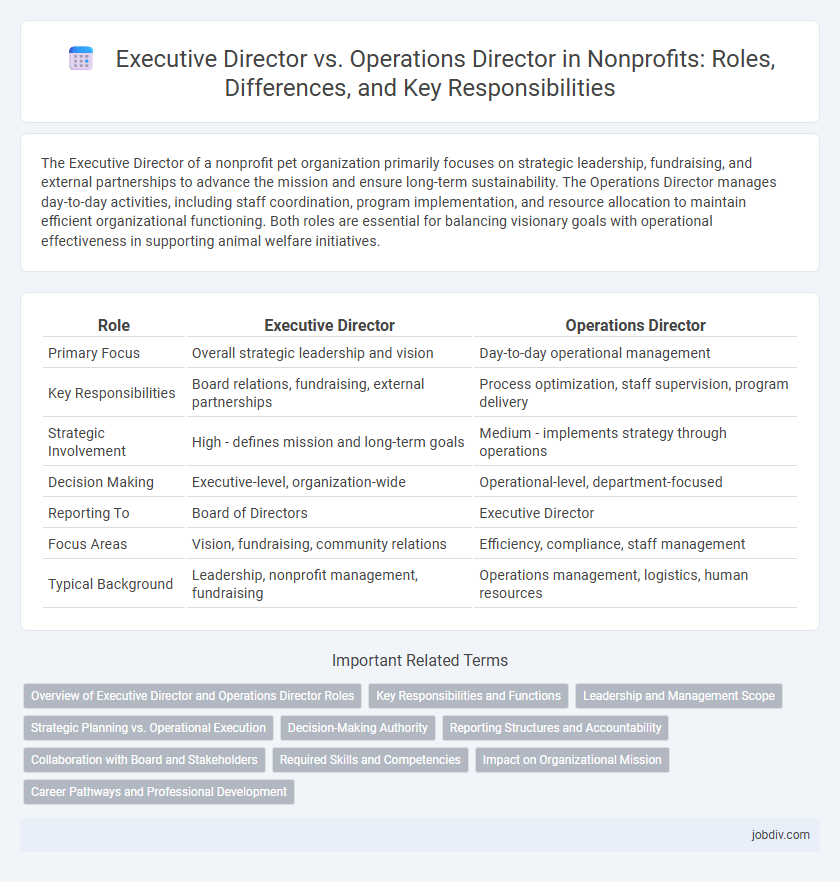The Executive Director of a nonprofit pet organization primarily focuses on strategic leadership, fundraising, and external partnerships to advance the mission and ensure long-term sustainability. The Operations Director manages day-to-day activities, including staff coordination, program implementation, and resource allocation to maintain efficient organizational functioning. Both roles are essential for balancing visionary goals with operational effectiveness in supporting animal welfare initiatives.
Table of Comparison
| Role | Executive Director | Operations Director |
|---|---|---|
| Primary Focus | Overall strategic leadership and vision | Day-to-day operational management |
| Key Responsibilities | Board relations, fundraising, external partnerships | Process optimization, staff supervision, program delivery |
| Strategic Involvement | High - defines mission and long-term goals | Medium - implements strategy through operations |
| Decision Making | Executive-level, organization-wide | Operational-level, department-focused |
| Reporting To | Board of Directors | Executive Director |
| Focus Areas | Vision, fundraising, community relations | Efficiency, compliance, staff management |
| Typical Background | Leadership, nonprofit management, fundraising | Operations management, logistics, human resources |
Overview of Executive Director and Operations Director Roles
The Executive Director oversees the strategic vision, fundraising, and external relations of a nonprofit, ensuring alignment with the organization's mission and long-term goals. The Operations Director manages day-to-day administrative functions, including staff supervision, program implementation, and operational efficiency. Both roles require strong leadership but focus respectively on high-level strategy and internal organizational processes.
Key Responsibilities and Functions
The Executive Director in a nonprofit primarily focuses on strategic leadership, stakeholder engagement, and overall organizational vision, ensuring alignment with the mission and securing funding through donor relationships. The Operations Director oversees daily administrative functions, program implementation, resource management, and maintains operational efficiency to support program goals. Both roles are crucial, with the Executive Director driving external growth and governance, while the Operations Director manages internal processes and staff execution.
Leadership and Management Scope
The Executive Director provides strategic leadership, overseeing overall organizational vision, fundraising, and external relations to ensure mission alignment and sustainability. The Operations Director manages day-to-day organizational functions, including program implementation, staff coordination, and operational efficiency. While the Executive Director focuses on long-term growth and stakeholder engagement, the Operations Director emphasizes internal management and process optimization.
Strategic Planning vs. Operational Execution
The Executive Director in a nonprofit primarily drives strategic planning by setting long-term goals, forging partnerships, and ensuring the organization's mission aligns with community needs. In contrast, the Operations Director focuses on operational execution, managing day-to-day activities, overseeing program delivery, and optimizing internal processes to meet strategic objectives. Effective collaboration between these roles ensures seamless translation of vision into actionable results, enhancing organizational impact and sustainability.
Decision-Making Authority
Executive Directors in nonprofits hold primary decision-making authority, overseeing strategic planning, board relations, and external partnerships to drive organizational mission fulfillment. Operations Directors manage day-to-day activities, implementing Executive Director directives and optimizing internal processes to ensure operational efficiency. While the Executive Director focuses on high-level governance and long-term vision, the Operations Director concentrates on tactical execution within established frameworks.
Reporting Structures and Accountability
Executive Directors typically report to the Board of Directors and hold ultimate accountability for the nonprofit's strategic vision, financial health, and overall mission success. Operations Directors report directly to the Executive Director, managing day-to-day activities and ensuring program implementation aligns with organizational goals. Clear hierarchies enhance transparency and streamline decision-making, improving nonprofit performance and stakeholder trust.
Collaboration with Board and Stakeholders
The Executive Director serves as the primary liaison between the nonprofit's board of directors and its senior management, ensuring strategic alignment and transparent communication with key stakeholders. The Operations Director focuses on executing the board's directives through efficient management of daily activities and resource allocation, supporting organizational goals. Close collaboration between these roles enhances governance, strengthens stakeholder trust, and drives mission-focused impact.
Required Skills and Competencies
Executive Directors in nonprofits require strategic leadership, fundraising expertise, and stakeholder engagement skills to drive organizational vision and secure resources. Operations Directors must excel in process management, financial oversight, and team coordination to ensure efficient daily operations and program delivery. Both roles demand strong communication, problem-solving abilities, and proficiency in nonprofit regulations.
Impact on Organizational Mission
The Executive Director drives the nonprofit's strategic vision, ensuring alignment with the organization's mission and long-term goals. The Operations Director focuses on optimizing internal processes, resources, and staff management to enhance efficiency and service delivery. Both roles are critical: the Executive Director shapes mission impact at a high level, while the Operations Director ensures operational excellence that supports mission fulfillment.
Career Pathways and Professional Development
Executive Directors in nonprofits typically advance through strategic leadership roles, gaining experience in fundraising, governance, and stakeholder engagement to shape organizational vision. Operations Directors often progress from management positions overseeing program implementation, financial management, and staff coordination, building expertise in operational efficiency and resource allocation. Professional development for both roles includes targeted training in nonprofit management, leadership skills, and sector-specific certifications to enhance effectiveness and career growth within the nonprofit industry.
Executive Director vs Operations Director Infographic

 jobdiv.com
jobdiv.com